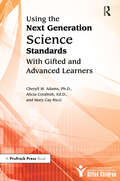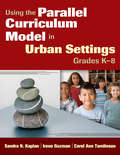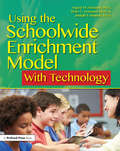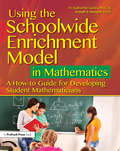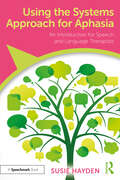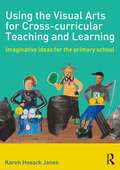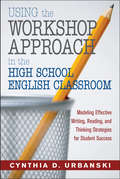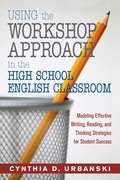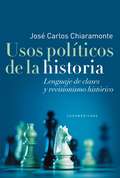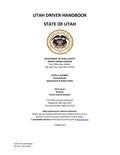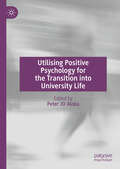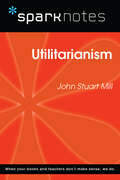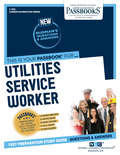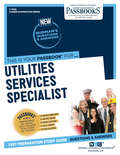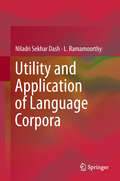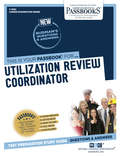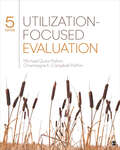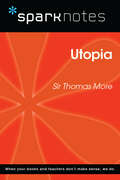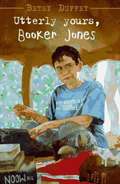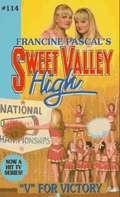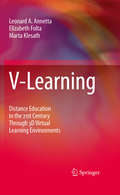- Table View
- List View
Using the Next Generation Science Standards With Gifted and Advanced Learners
by Cheryll M. Adams Alicia Cotabish Mary RicciUsing the Next Generation Science Standards With Gifted and Advanced Learners provides teachers and administrators examples and strategies to implement the Next Generation Science Standards (NGSS) with gifted and advanced learners at all stages of development in K-12 schools. The book describes—and demonstrates with specific examples from the NGSS—what effective differentiated activities in science look like for high-ability learners. It shares how educators can provide rigor within the new standards to allow students to demonstrate higher level thinking, reasoning, problem solving, passion, and inventiveness in science. By doing so, students will develop the skills, habits of mind, and attitudes toward learning needed to reach high levels of competency and creative production in science fields.
Using the Parallel Curriculum Model in Urban Settings, Grades K-8
by Sandra N. Kaplan Dr Carol Ann Tomlinson Irene GuzmanFeaturing 16 field-tested lesson plans, this book presents a high-quality curriculum that helps urban youth develop key learning skills such as resiliency, self-motivation, and collaboration.
Using the Schoolwide Enrichment Model With Technology
by Joseph Renzulli Brian Housand Angela HousandUsing the Schoolwide Enrichment Model With Technology is an extension of a talent development model implemented in more than 2,500 schools across the U.S. and widely used internationally. More than 40 years of research and development have documented the effectiveness of the SEM approach to promoting higher level thinking skills and creative productivity. This solution-oriented book, unlike other books focused on using technology in the classroom, recognizes that digital technologies are changing and evolving at lightning speeds. Our effective skills for using technology transcend time by focusing on how to find and use digital resources and tools rather than listing the resources that already exist. Focusing on the skills that support critical thinking and problem solving, decision making, and communication, the authors seamlessly merge technology to launch students toward independent productivity. This accessible and highly practical guide is rich with examples that will change the way you think about education while providing hands-on “how-to” guidance for creating a culture of excellence and innovation in your school and classroom.
Using the Schoolwide Enrichment Model in Mathematics: A How-To Guide for Developing Student Mathematicians
by Joseph S. Renzulli M. Katherine GavinUsing the Schoolwide Enrichment Model in Mathematics: A How-to Guide for Developing Student Mathematicians applies the teaching and learning strategies of the Schoolwide Enrichment Model (SEM) to the math classroom. Based on more than 40 years of research and development and used in schools around the world, the SEM approach focuses on promoting higher level thinking skills and creative productivity. Using this approach in mathematics, this new guidebook promotes the use of the Mathematical Practices outlined in the Common Core State Standards as the underlying processes and proficiencies that should be developed in students. Teachers learn how to create a culture of enjoyment, engagement, and enthusiasm for all students, and in particular gifted students, while developing students who think and act like mathematicians. Easy to read and use, the book incorporates many practical suggestions, including views from the classroom and sample activities from NAGC-award winning curriculum to motivate and challenge students.
Using the Systems Approach for Aphasia: An Introduction for Speech and Language Therapists
by Susie HaydenUsing the Systems Approach for Aphasia introduces therapists to systems theory, exploring the way in which a holistic method that is already a key part of other health and social care settings can be employed in aphasia therapy. Detailed case studies from the author’s own extensive experience demonstrate how systemic tools can be incorporated into practice, offering practical suggestions for service delivery and caseload management in frequently overloaded community health services. Exploring the treatment process from first encounters, through the management of goals and attainments, to caring for patients after therapy has ended, the book demonstrates a method of delivering therapy in a way that will better serve the people who live with aphasia and their families, as well as the clinician themselves. Key features of this book include: • An accessible overview of systems theory and its use in aphasia therapy. • Consideration of how current popular ideas such as self-management, holistic rehabilitation and compassion focussed therapy can be incorporated to provide the best treatment. • Guidance on when and how to involve families based on case studies. • Case studies throughout to fully illustrate systemic approaches. An essential resource for both students and seasoned clinicians, the theory explored in this book will provide a fresh approach to therapy and new skills for working with people with aphasia and their families.
Using the View Camera: Revised Edition
by Steve SimmonsInformation on large-format cameras, their accessories, and films is clearly presented in this updated guide, which covers all the technical aspects of using the view camera.
Using the Visual Arts for Cross-curricular Teaching and Learning: Imaginative ideas for the primary school
by Karen Hosack JanesAs schools are being encouraged to develop more flexible and creative approaches to education, Using the Visual Arts for Cross-curricular Teaching and Learning provides practical guidance and ideas on using the visual arts as a starting point for imaginative, effective learning across a wide range of curriculum subjects. Underpinned by established and current educational thinking, it uses real-life examples to explore how this approach has been used successfully by individual class teachers and as whole-school projects. Offering proven strategies supporting the principles of personalized learning, it will help you involve children in devising cross-curricular themes and setting their own lines of enquiry. Supplemented throughout with case studies and ideas for great artworks to get projects started, as well as examples of children’s own work, it explores: developing individual pupils' talent and respect for their own and other cultures; using a single painting as a starting point for learning in a range of subjects; finding inspiration for your own cross-curricular projects using the visual arts; underpinning all activities with educational purpose; planning for and assessing progression in learning; discovering and using art resources in your region. The tried and tested strategies in Using the Visual Arts for Cross-curricular Teaching and Learning will give all primary school teachers the confidence to explore the benefits of placing the visual arts at the centre of a creative, appealing curriculum.
Using the Workshop Approach in the High School English Classroom: Modeling Effective Writing, Reading, and Thinking Strategies for Student Success
by Cynthia D. UrbanskiTake a peek into an effective workshop-based classroom and discover how you can enhance adolescents' technical and creative abilities in reading, writing, and thinking.
Using the Workshop Approach in the High School English Classroom: Modeling Effective Writing, Reading, and Thinking Strategies for Student Success
by Cynthia D. UrbanskiDo you find that preparing for standardized tests interferes with teaching advanced thinking, reading, and writing skills in a meaningful way? Do you want to balance test preparation with more creative activities? Success in school and beyond depends on one’s ability to read fluently, write coherently, and think critically. This handbook uses the workshop model for exponentially increasing adolescents’ abilities in these three key areas. This practical guide addresses the daily running and practice of a workshop-based classroom, using research and the author’s own experiences to illustrate how to establish a workshop that: Fosters lasting learning while reinforcing the skills needed for standardized tests Teaches audience and purpose as a vehicle to style and structure Provides a supportive and lively environment in which students are comfortable enough to take risks and share original ideas Try Urbanski’s approach to teaching literacy analysis and mentoring student writers, and discover just how rewarding the workshop experience can be!
Usos políticos de la historia: Lenguaje de clases y revisionismo histórico
by José Carlos ChiaramonteEnsayos sobre el revisionismo histórico, sus orígenes y sus polémicas.El libro incluye textos de investigación, textos periodísticos dedivulgación científica y dos artículos inéditos y sustanciales en tornoa los conceptos de clase social y lucha de clases. «Sabemos desde hace mucho que la historia es, entre otras cosas, uncementerio de ideas falsas. Solo que siempre resulta oportuno establecersi se llegó a ellas intencionalmente o no. A fines del siglo XIX, porejemplo, el historiador alemán Heinrich von Treitschke se burlaba de la"objetividad anémica" para afirmar que la verdad histórica "es aquellaque sirve a la nación". Como resulta evidente, desde esta perspectivacuenta más la utilidad política que la validez científica de losenunciados. Comparto la saludable reacción de Chiaramonte contra estetipo de pensamiento, que recorre buena parte del segundo revisionismo yque hoy se manifiesta en textos de divulgación de amplia venta, cuyasinterpretaciones proyectan deliberadamente sus particulares lecturas delpresente sobre el pasado y no a la inversa». Del prefacio de José Nun
Usumenyezelwe-ke Umcebo IsiZulu Novel Eyezikole: UBC contracted
by M. J. MngadiUNomvula ongumsebenzi wasemajalidini, uwina imali engaphezu kwezigidi ezimbili zamarandi emjahweni wamahhashi. Lokhu kungukuqala kwezinkinga empilweni yakhe. Le noveli iqokelwe ukufundwa ebangeni leshumi nambili. Kukhona izibonelo zemibuzo nezimpendulo.
Usumenyezelwe-ke Umcebo IsiZulu Novel Eyezikole: UBC uncontracted
by M. J. MngadiUNomvula ongumsebenzi wasemajalidini, uwina imali engaphezu kwezigidi ezimbili zamarandi emjahweni wamahhashi. Lokhu kungukuqala kwezinkinga empilweni yakhe. Le noveli iqokelwe ukufundwa ebangeni leshumi nambili. Kukhona izibonelo zemibuzo nezimpendulo.
Utah Driver Handbook
by Utah Department of Public Safety - Driver License Division<p>This manual contains the rules which should be followed when operating any vehicle on Utah roads. The operator of a bicycle must obey the same rules of the road, and has the same rights and duties as the operator of a motor vehicle or other vehicle. <p>NOTE: Please beware of imitator websites. For accurate Driver License information and forms visit: dld.utah.gov.</p>
Utilising Positive Psychology for the Transition into University Life
by Peter Jo AlokaThis book uses a positive psychology approach to the assist freshmen/first year students in the transition to University life. New University are faced with varied adjustment challenges on the transition from secondary school to higher education because there are vast differences between secondary schooling and university environment including learning and teaching styles, expectation to manage themselves. Positive psychology involves reflecting on one’s weaknesses and strengths and how to capitalize on the latter and so, using case studies from South African universities, this book details how knowledge of ones strengths and weaknesses can help new University students engage in the learning process. As such, this pioneering work will be of interest to students, educators and therapy practitioners alike.
Utilitarianism (SparkNotes Philosophy Guide)
by SparkNotesUtilitarianism (SparkNotes Philosophy Guide) Making the reading experience fun! SparkNotes Philosophy Guides are one-stop guides to the great works of philosophy–masterpieces that stand at the foundations of Western thought. Inside each Philosophy Guide you&’ll find insightful overviews of great philosophical works of the Western world.
Utilities Service Worker: Passbooks Study Guide (Career Examination Series)
by National Learning CorporationThe Utilities Service Worker Passbook® prepares you for your test by allowing you to take practice exams in the subjects you need to study. It provides hundreds of questions and answers in the areas that will likely be covered on your upcoming exam.
Utility Services Specialist: Passbooks Study Guide (Career Examination Series)
by National Learning CorporationThe Utility Services Specialist Passbook® prepares you for your test by allowing you to take practice exams in the subjects you need to study. It provides hundreds of questions and answers in the areas that will likely be covered on your upcoming exam.
Utility and Application of Language Corpora
by Niladri Sekhar Dash L. RamamoorthyThis book discusses some of the basic issues relating to corpus generation and the methods normally used to generate a corpus. Since corpus-related research goes beyond corpus generation, the book also addresses other major topics connected with the use and application of language corpora, namely, corpus readiness in the context of corpus sanitation and pre-editing of corpus texts; the application of statistical methods; and various text processing techniques. Importantly, it explores how corpora can be used as a primary or secondary resource in English language teaching, in creating dictionaries, in word sense disambiguation, in various language technologies, and in other branches of linguistics. Lastly, the book sheds light on the status quo of corpus generation in Indian languages and identifies current and future needs.Discussing various technical issues in the field in a lucid manner, providing extensive new diagrams and charts for easy comprehension, and using simplified English, the book is an ideal resource for non-native English readers. Written by academics with many years of experience teaching and researching corpus linguistics, its focus on Indian languages and on English corpora makes it applicable to graduate and postgraduate students of applied linguistics, computational linguistics and language processing in South Asia and across countries where English is spoken as a first or second language.
Utilization Review Coordinator: Passbooks Study Guide (Career Examination Series #C-3262)
by National Learning CorporationThe Utilization Review Coordinator Passbook® prepares you for your test by allowing you to take practice exams in the subjects you need to study. It provides hundreds of questions and answers in the areas that will likely be covered on your upcoming exam, including but not limited to: evaluating health care; medical, psychiatric, developmental conditions and treatments; understanding and interpreting written material; and more.
Utilization-Focused Evaluation
by Michael Quinn Patton Charmagne E. Campbell-PattonThe Fifth Edition of the bestselling Utilization-Focused Evaluation provides expert, detailed advice on conducting evaluations that promote effective use of the findings. Chock full of useful pedagogy, this book presents Michael Quinn Patton′s distinctive opinions based on more than forty years of experience, and also the expertise of new co-author Charmagne E. Campbell-Patton. The authors begin by describing the essence of utilization-focused evaluation, and then outline 10 operating principles. They conclude with chapters focused on how evaluation can be used to promote a more thoughtful, equitable, and sustainable world. Richly illustrated with examples, figures, and cartoons, this engaging text shows readers how to design and conduct evaluations that provide useful findings, and which contribute to a more equitable society. A companion website is available to accompany this book.
Utilization-Focused Evaluation
by Michael Quinn Patton Charmagne E. Campbell-PattonThe Fifth Edition of the bestselling Utilization-Focused Evaluation provides expert, detailed advice on conducting evaluations that promote effective use of the findings. Chock full of useful pedagogy, this book presents Michael Quinn Patton′s distinctive opinions based on more than forty years of experience, and also the expertise of new co-author Charmagne E. Campbell-Patton. The authors begin by describing the essence of utilization-focused evaluation, and then outline 10 operating principles. They conclude with chapters focused on how evaluation can be used to promote a more thoughtful, equitable, and sustainable world. Richly illustrated with examples, figures, and cartoons, this engaging text shows readers how to design and conduct evaluations that provide useful findings, and which contribute to a more equitable society. A companion website is available to accompany this book.
Utopia (SparkNotes Philosophy Guide)
by SparkNotesUtopia (SparkNotes Philosophy Guide) Making the reading experience fun! SparkNotes Philosophy Guides are one-stop guides to the great works of philosophy–masterpieces that stand at the foundations of Western thought. Inside each Philosophy Guide you&’ll find insightful overviews of great philosophical works of the Western world.
Utterly Yours, Booker Jones
by Betsy DuffeyMiddle school student and aspiring author Booker Jones is evicted from his bedroom when his grandfather moves in, creating problems both at home and at school.
V for Victory (Sweet Valley High #114)
by Francine PascalSweet Valley High cheerleaders are going to the Nationals!
V-Learning
by Leonard A. Annetta Elizabeth Folta Marta KlesathEqually grounded in the research and the practical applications developed by the authors over a number of years, this book shows how virtual learning environments could represent the future of higher education. As academics begin to use environments such as Second Life to reach a broader student audience, this volume offers the distance-learning community (administrators, faculty, and students) a different, yet successful, approach to delivering content over the Internet through 3D virtual learning environments that have the potential to transform higher education. Covering a broad spectrum of frameworks, from commercial multiplayer video games to online learning, the book shows just how powerful these environments can be in the arena of education, and concludes that data-driven practice will ensure almost universal take-up, even among those currently unwilling to use V-learning. The authors provide numerous practical examples of distance learning in its current state of development, as well as making informed predictions about how future environments might evolve. This much-needed book is right at the cutting edge of its subject, and comes at a time when research in both educational gaming and distance learning are converging.
